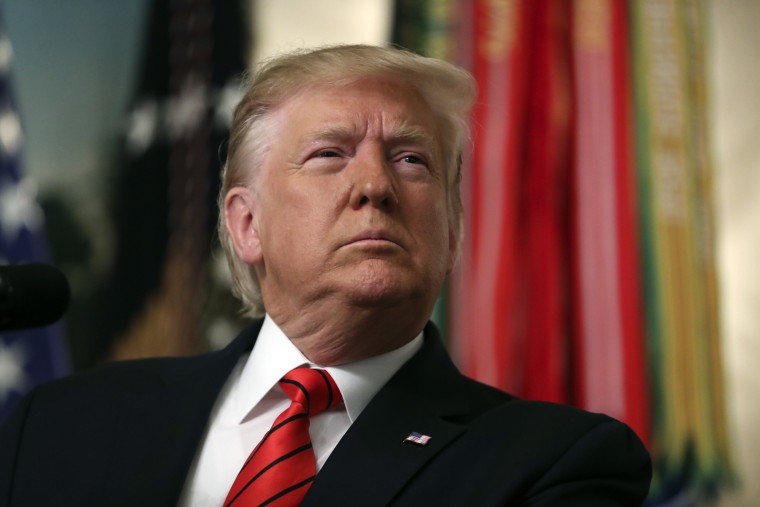WASHINGTON — President Donald Trump needed a win and he got one, adding one more presidential moment to the reel that will play in voters' minds when they cast ballots a year from now.
The killing of Abu Bakr al-Baghdadi provides a reprieve for Trump from the daily drumbeat of impeachment developments and an opportunity to show himself as commander in chief amid harsh bipartisan criticism of his decision to pull U.S. troops from parts of Syria and as the Democratic race to challenge him heats up.
As with the killing of Osama bin Laden, it is far enough from the election to not appear politically motivated yet close enough to remain in voters' minds.
But despite the parallels, al-Baghdadi doesn't hold the same place in Americans' mind as Osama bin Laden.
"Who is the super-villain? It's bin Laden," said Rick Wilson, a Republican strategist and caustic Trump critic. "Baghdadi is unquestionably a bad guy, but Americans saw the result of bin Laden. It's like Trump saying, ‘I killed a mouse but ignore the elephant.’”
Still, Trump's effort to stamp out ISIS has been a key talking point in his pitch to voters and the killing of Baghdadi bolsters that narrative, as long as there isn't a resurgence of the terrorist organization over the next year, as some foreign policy experts fear.
The death of bin Laden was handily used by Obama's 2012 re-election bid, with Vice President Joe Biden memorably appealing to voters with the line that "bin Laden is dead and General Motors is alive."
Trump, who in 2012 said Obama should not be congratulated for the death of bin Laden because he was killed by Navy Seals, was quick to take credit himself for the raid that took down al-Badhdadi, claiming it was even bigger than the killing of bin Laden.
"Bin Laden was a big thing, but this is the biggest there is, this is the worst ever," Trump said. "Osama bin Laden was big, but Osama bin Laden became big with the World Trade Center. This is a man who built a whole, as you would like to call it a country, a caliphate and was trying to do it again."
Al-Baghdadi's death also helps counter criticism that the U.S. is giving up ground in the Middle East following Trump's withdrawal of American forces in Syria and the president's frequent comments about no longer acting as the world's policeman.
Now the question will be how long Trump can capitalize on the win. His administration has a history of undermining its own successes through controversy, unforced errors and mixed messaging — and there will be a new roster of witnesses this coming week on the House impeachment inquiry.
Trump's allies have already complained about the media not giving the president enough credit, pointing to The Washington Post describing al-Baghdadi as an "austere religious scholar" in a headline on his obituary, although it was quickly changed.
"It took 10 minutes for the news media to pivot to reassuring each other that it won't boost Trump," tweeted Trump campaign communications director Tim Murtaugh. "Today is a great day. It's okay to be happy about it, folks."
Trump is already facing criticism for taking a victory lap. Former U.S. officials have raised concerns about a resurgence of ISIS with the U.S. pulling back troops in Syria, and there also remains a threat from al Qaeda.
"It is fooling the American people thinking that the threat is abating because of this action," said Lawrence Wilkerson, former chief of staff to Secretary of State Colin Powell. "It is not abating. You never defeat terrorism; the best you can do is manage it."
Even during his announcement of the killing, Trump struggled to stay focused on the main message. After giving prepared remarks that lasted about 10 minutes, the president spent more than half an hour taking questions from the small group of reporters in the White House's Diplomatic Reception Room.
Trump gave a graphic depiction of the events as if he were retelling an action movie, describing how al-Baghdadi was "whimpering, crying and screaming" before blowing up himself and his three children with a suicide vest at the end of a closed tunnel as U.S. forces closed in.
The remarks turned political at times, as Trump suggested he didn't inform House Speaker Nancy Pelosi and other Democrats about the raid ahead of time because he believed they would leak the sensitive information. He also heaped thanks on Russia for cooperating, something that has stoked criticism given Moscow's opposing interests in the region.
Trump also turned the focus on himself, claiming that he had predicted the Sept. 11 attacks, that he was right to oppose the invasion of Iraq and that ISIS uses "the internet better than almost anybody in the world, perhaps other than Donald Trump."
That contrasts with modest statements by Obama following the bin Laden raid and George W. Bush after the capture of Saddam Hussein, both of whom gave much less focus to their own roles.
During his lengthy retelling of events, Trump also revealed numerous details about the U.S. military operation, a habit that has drawn criticism in the past.
"The Special Ops guys have to do this over and over again, so the less we say about operation details the better, generally speaking," said Evelyn Farkas, a former deputy assistant secretary of defense for Russia, Ukraine and Eurasia.


